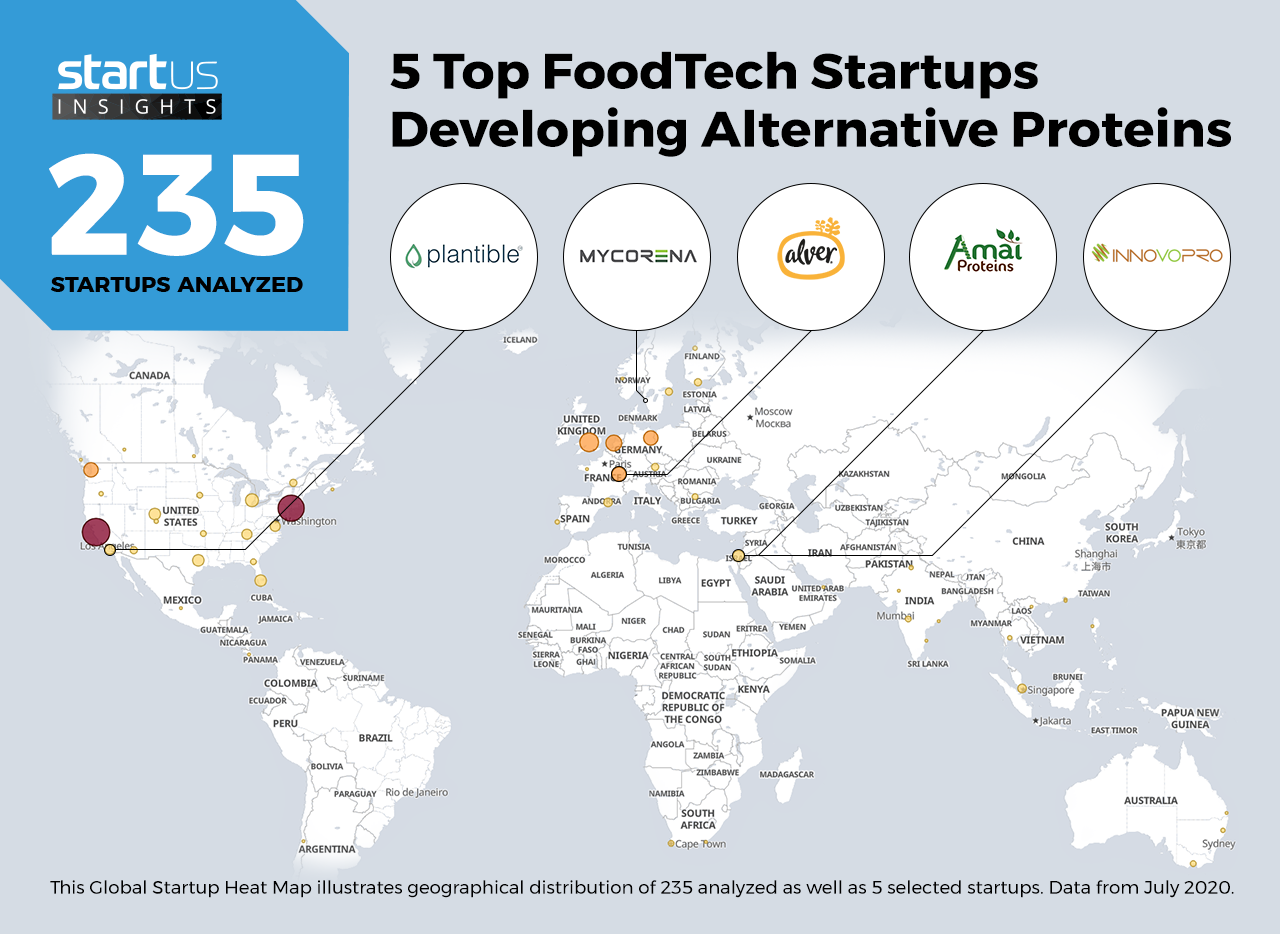Our Innovation Analysts recently looked into emerging technologies and up-and-coming startups working on FoodTech solutions. As there is a large number of startups working on a wide variety of solutions, we decided to share our insights with you. This time, we are taking a look at 5 promising alternative protein companies.
Heat Map: 5 Emerging Alternative Protein Companies
Through the Big Data & Artificial Intelligence (AI)-powered StartUs Insights Discovery Platform, covering over 3 790 000+ startups & scaleups globally, we identified 235 alternative protein startups. The Global Startup Heat Map below highlights the 5 alternative protein solutions you should watch as well as the geo-distribution of all 235 startups & scaleups we analyzed for this research. Based on the heat map, we see high startup activity in the US. They include plant-based protein companies and startups developing mycoproteins.
Interested to explore all 230+ alternative protein startups & scaleups?
Amai Proteins develops a Sweet Protein
Consumption of added sugar in high amounts is dangerous for human health in many ways. Excessive sugar consumption is linked with higher blood pressure, inflammation, weight gain, diabetes, and an increased risk for heart attack and stroke. Yet many people find it hard to give up consumption of sweet-tasting products and drinks, often at a risk to their health. A great solution to this health problem is a sugarless sweet protein that binds to human sweet taste receptors just like sugar.
Amai Proteins is an Israeli startup that produces healthy sweet protein. The product has a zero glycemic index, zero calories, and is thermostable. As a result, this product is applicable to the mass food market and is cheaper than sugar in sweetness units. Amai Proteins applies Agile Integrative Computational Protein Design (AI-CPD) and precision fermentation biotechnology in production.
Alver manufactures Algae-based Protein
Another great alternative to animal and plant-based proteins is algae protein. Algae protein requires less water and emits less carbon dioxide (CO2) than traditional proteins, especially animal-based ones. One of the main challenges for the wider adoption of seaweed-based protein is its specific taste and odor. Startups are using innovative technologies and fermentation processes to produce neutrally tasting and smelling algae protein.
Swiss startup Alver uses fermentation to produce vegan protein powder from golden Chlorella algae. This algae-based protein offers a neutral taste and, therefore, works well with various recipes. The Alver protein powder also contains vitamins B1, B2, and B6, as well as calcium, iron, magnesium, phosphorus, and zinc.
Plantible Foods offers a Duckweed Protein
Duckweed, a free-floating micro-aquatic plant also known as the water lentil or lemna, is a source of alternative protein. Lemna has a number of advantages over conventional protein sources. Duckweed does not require farmland, irrigation, or the use of pesticides, hexane, or other toxic chemicals to cultivate. Moreover, the water used in the production process is recycled through a closed-loop system. Besides that, duckweed has a naturally fast growth rate, enabling harvest on a daily basis.
The US-based startup Plantible Foods produces lemna protein using environmentally friendly cultivation and extraction processes. The proprietary indoor aqua farming process does not use pesticides and recycles nearly 95% of the water. Plantible Foods’ protein has a neutral taste, odor, and color, which makes it suitable for use in a wide range of products and recipes. The startup’s protein is also free from common allergens.
Innovopro provides a Chickpea Protein
Many consumers are expressing concerns regarding genetically modified soy, as well as the general use of pesticides and phytoestrogens while growing the bean. This drives demand for alternative plant-based proteins that cater to crops as well. Chickpea is a good protein alternative to soy as it is free of phytoestrogens, allergens, and gluten. Besides, chickpeas have a neutral taste, color, and a good nutritional profile.
Israeli startup Innovopro produces a 70% chickpea protein concentrate. The company’s protein has a neutral taste, emulsifying and foaming properties, and is usable both in cold and warm applications. Innovopro protein concentrates are suitable ingredients for a wide range of products, including vegan burgers, vegan ice-cream, non-dairy milk products, vegan mayonnaise, and baked snacks.
Mycorena makes a Fungal Protein
Mycoprotein, a protein extract from edible fungi, is an environmentally friendly alternative to meat and other animal-based proteins. Recent studies show that the production of mycoproteins generates significantly lower greenhouse gas emissions than beef and chicken. Mycoproteins also utilize considerably fewer resources, in terms of land and water, in comparison to conventional beef production. The startups are developing innovative technologies that enable even more sustainable mycoproteins, such as the use of organic residue from agricultural waste streams.
Sweden-based Mycorena develops sustainable processes for converting agriculture waste streams into high-protein products. The company uses organic waste as feedstock to cultivate edible fungi. Mycorena uses fermentation to create Promyc, a product with a neutral taste, a meat-like texture, and nutritional content of protein (60%) and fiber (12%).
Discover All Emerging FoodTech Startups
The FoodTech startups showcased in this report are only a small sample of all startups we identified through our data-driven startup scouting approach. Download our free FoodTech Innovation Report for a broad overview of the industry or get in touch for quick & exhaustive research on the latest technologies & emerging solutions that will impact your company!




![Food and Beverage Industry: Top 10 Technology Trends [2025 & Beyond]](https://www.startus-insights.com/wp-content/uploads/2024/11/Food-and-Beverage-Industry-Trends-SharedImg-StartUs-Insights-noresize-420x236.webp)




